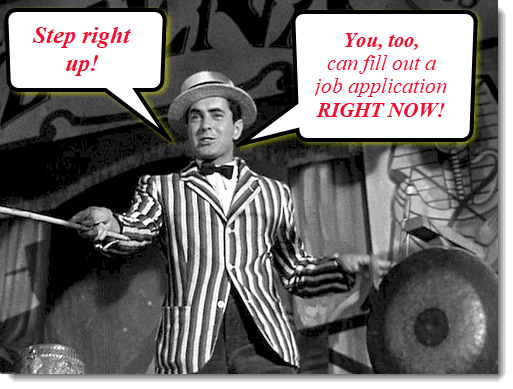In the December 12, 2017 Ask The Headhunter Newsletter, a manager gets fed up with behavioral interview questions and wants to know how to really judge a job applicant.
Question
My HR department insists I use a list of 30 Essential Behavioral Interview Questions published by LinkedIn when I meet with job applicants. These are the questions 1,300 hiring managers said they use.
The questions are canned and don’t reveal whether a candidate could do the job if I hired them. It feels silly to ask these questions because it’s like dancing around the REAL question — whether the person can do the job! What do I care how they handled a difficult situation at their last job, when they have no idea what a really difficult situation is at my company?
I haven’t gotten busted yet, but I’m one hiring manager who doesn’t use the behavioral questions. Maybe there’s something I don’t get. Do you advocate using them and, if you do, please explain the benefits.
Nick’s Reply
I don’t use behavioral interview questions. Like you, I think the practice is silly — and it’s frankly lame because, as you suggest, it’s like “dancing around the real question.” Behavioral interviews are indirect assessments that create more guesswork instead of enabling a manager to directly assess whether an applicant can do the work.
You don’t say how you interview and assess job candidates, but you hint that you focus your interviews on a direct assessment of whether the person can do the job you need to fill.
If we could all hire only great people who perform to their max, we’d all be rich. But choosing and managing new hires is a dicey proposition. I’ll warn you that my approach to interviewing job applicants will result in some of them canceling the interviews you schedule. No worries — it’ll just save you time.
The problem with behavioral interview questions
Loads of candidate assessment methods have come and gone through the decades. My own approach as a headhunter is to get one key question answered before I go on to other assessments.
Can the candidate demonstrate that he or she can actually do the job?
Surprisingly, that’s left out of most job interviews. Instead of getting a demonstration, most employers do an indirect assessment. They ask job applicants the popular set of “behavioral interview” questions, hoping they can read between the lines of a person’s answers about how they handled certain situations in the past. (Job seekers: See The Basics.)
If your HR requires you to use behavioral interviews, I agree that not getting busted for not using them should be your goal!
The HO-HO-HO 40% OFF Everything SPECIAL!
Every Ask The Headhunter PDF Book
Is 40% OFF for the holidays!
* * *THIS SPECIAL OFFER HAS EXPIRED * * *
(What books are we talking about? Click here to see all Nick’s PDF books!)
Fearless Job Hunting • How to Work With Headhunters • Changing Careers
Keep Your Salary Under Wraps • Parting Company | How to leave your job
Employment Tests: Get The Edge
TAKE 40% OFF any book! ORDER NOW!
Use DISCOUNT CODE=HOHO40
This is a limited-time discount!
* * *THIS SPECIAL OFFER HAS EXPIRED * * *
3 Anti-Behavioral Interview Questions
Here’s my take on some of the lame questions LinkedIn suggests — and 3 anti-behavioral interview alternatives that actually nudge candidates to demonstrate how they’ll do the work. These are direct assessments because you’ll be talking about your team, your work, your job — not about some hypothetical situation that you don’t even know the applicant is telling the truth about.
Behavioral Question #1:
“Tell me about the biggest change that you have had to deal with. How did you adapt to that change?”
My anti version:
“We hit a challenge with the project you’ll be working on if we hire you. [Describe the problem or challenge in detail.] How would you approach that?”
That’s is a discussion about real change. You can of course ask the applicant about similar issues they’ve faced at other jobs. But if you focus on specific issues you’re facing, you’ll quickly learn not just how the person approaches work; you’ll learn a lot about problem-solving abilities that are relevant to you.
Behavioral Question #2:
“Tell me about a time in the last week when you’ve been satisfied, energized, and productive at work. What were you doing?”
My anti version:
Don’t ask a question. Invite the applicant to spend a couple of hours with your team in a live work meeting about a live project. Sit in on the meeting, but don’t say anything. Watch and listen. My guess is you’ll learn most of what you need to know about the candidate’s style and motivation, and it’ll be relevant to your setting, not someone else’s.
Behavioral Question #3:
“Describe a time when you volunteered to expand your knowledge at work, as opposed to being directed to do so.”
My anti version:
“Now that we’ve discussed the deliverables we’d expect from you on this job, please list the three relevant areas where you’d need to expand your knowledge. This is not a loaded question — I expect you’ll be learning as you go. Then outline how you’d get that knowledge and what you’d need from me to help you do it.”
I’m sure you see the difference in the questions. Though it may be interesting, I don’t care so much how you handled something at your last job. After all, I’m not hiring you for your past performance. I want a demonstration of how you’ll do this job for me.
Behavioral interview answers can be faked
Like other canned interview questions, clever candidates can study any of a number of books that list loads of typical behavioral interview questions. If you ask, “Tell me about a time when…”, you have no idea whether the experience the candidate discusses is real or from a book.
When you ask the questions I suggest, the applicant has to deal with a real-life situation from your business. You get to see how they’d handle a problem or challenge in the present or in the future. I can’t confirm what an applicant did in the past, so let’s talk shop on my turf, about the work I need done.
The book includes “How to do a Working Interview,” “What’s your business plan for this job?” and 10 other methods to show you’re the profitable hire — plus 8 How to Say It tips.
How to cull out the weak applicants
Now I’ll leave you with an unexpected suggestion to get the most out of your interviews. Let a candidate know in advance what you’re going to ask about.
Surprise every candidate. Call them in advance of your interview. (If they’re worth a face-to-face meeting, they’re worth calling first!) Outline the work, projects and challenges you want them to discuss with you and your team when they arrive. Let them prepare, just like you expect your employees prepare when you give them an assignment.
Heck, help them prepare. You want them to succeed, right? The best candidates will show up ready to rumble. (Check this article I wrote for CMO.com: Why You Should Treat Job Applicants Like Consultants.)
Like I said, that saves you time.
The best candidates will be prepared, ready to rumble, and excited about talking shop with you and your team. You’ll actually see their behavior in your real-life work setting!
Do behavioral interviews work? Or are they just another trick that prevents a manager and job applicant from getting to really know one another? If you’re a manager, how do you directly assess someone’s ability to do the work during a job interview?
: :




 I’ve read many of your posts about job boards, including
I’ve read many of your posts about job boards, including  It’s a great fit. I
It’s a great fit. I  After three interviews that included a lengthy presentation on
After three interviews that included a lengthy presentation on  Earlier this week a recruiter contacted me. The salary was stated as a maximum only, and it would mean a 20% raise from my current salary. Even though I am not looking, I went ahead and applied.
Earlier this week a recruiter contacted me. The salary was stated as a maximum only, and it would mean a 20% raise from my current salary. Even though I am not looking, I went ahead and applied.  You’ve probably heard this from an HR manager who has demanded to know your salary history while you’re applying for a job: “It’s required. If you don’t disclose your salary we cannot proceed with your candidacy.”
You’ve probably heard this from an HR manager who has demanded to know your salary history while you’re applying for a job: “It’s required. If you don’t disclose your salary we cannot proceed with your candidacy.”

 I dunno — maybe we should start Job Seekers Anonymous? It’s time we worked up a way to address employers who claim to want “exceptional talent” but expect you to turn off your talent and apply-for-jobs-by-numbers.
I dunno — maybe we should start Job Seekers Anonymous? It’s time we worked up a way to address employers who claim to want “exceptional talent” but expect you to turn off your talent and apply-for-jobs-by-numbers. “Hi, I’m Bill, a seasoned pro in [your field]. I’m interested in working for your company because it’s a shining light in our industry. But I’m puzzled by something. As a very busy [programmer, marketer, whatever] I don’t have time to waste with impersonal cattle-calls and online job forms, so I’m surprised your company is advertising rather than recruiting only the right people thoughtfully. I select potential employers very carefully. I’m ready to meet with your [marketing manager] to show how I can do the job to bring more profit to your bottom line.
“Hi, I’m Bill, a seasoned pro in [your field]. I’m interested in working for your company because it’s a shining light in our industry. But I’m puzzled by something. As a very busy [programmer, marketer, whatever] I don’t have time to waste with impersonal cattle-calls and online job forms, so I’m surprised your company is advertising rather than recruiting only the right people thoughtfully. I select potential employers very carefully. I’m ready to meet with your [marketing manager] to show how I can do the job to bring more profit to your bottom line.
 I do not work in the tech field where I know these are common. I’ve worked in marketing for 15 years, won awards, and worked for some top-name businesses. But recently I have encountered many recruiters that want you to prove your worth.
I do not work in the tech field where I know these are common. I’ve worked in marketing for 15 years, won awards, and worked for some top-name businesses. But recently I have encountered many recruiters that want you to prove your worth.
 I’m an avid follower and have found Ask The Headhunter positively inspirational. I especially enjoy pushing back on senior executives for their lame hiring practices and nonsensical
I’m an avid follower and have found Ask The Headhunter positively inspirational. I especially enjoy pushing back on senior executives for their lame hiring practices and nonsensical